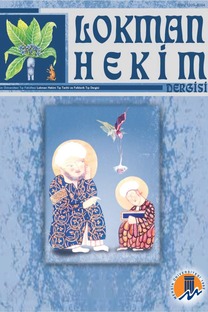İnsan Sağlığında Fitoöstrojenlerin Önemi
Fitoöstrojen, menopoz, kanser, osteoporoz, bitkisel tedavi
The Importance of Phytostrogenes in Human Health
Phytoestrogen, menopause, cancer, osteoporosis, cardiovascular system,
___
- Referans1 Liu, Z. H.; Kanjo, Y.; Mizutani, S. A review of phytoestrogens: their occurrence and fate in the environment. Water Res 2010, 44, 567-577.
- Referans2 Konar, N. Farklı Hidroliz Yöntemleriyle Bazı Sebzelerden Elde Edilen Fitoöstrojenlerin Hplc Ve Gc-Ms Ile Belirlenmesi Ankara Üniversitesifen Bilimleri Enstitüsü, 2011.
- Referans3 Baran S.M, K. N. Yemlerdeki Östrojenik Etkili Maddler ve Etkileri. İstanbul Üniversitesi Veterinerlik Dergisi 2000, 26, 141-148.
- Referans4 Özer Ö, K. B. Phytoestrogens and Their Effects On Menopause. Ankara Ecz. Fak. Derg 2007, 36, 199-222.
- Referans5 GÜRDÖL, F.: Tıbbi Biyokimya; 1 ed.; Nobel Tıp Kitabevleri, 2015. pp. 33-39
- Referans6 Ososki, A. L.; Kennelly, E. J. Phytoestrogens: a review of the present state of research. Phytotherapy Research 2003, 17, 845-869
- Referans7 Wang, C.-C.; Prasain, J. K.; Barnes, S. Review of the methods used in the determination of phytoestrogens. Journal of Chromatography B 2002, 777, 3-28.
- Referans8 Bakker, M. I. Dietary intake of phytoestrogens, RIVM report 320103002/2004.
- Referans9 Nilüfer, D.; Boyacıoğlu, D. Soya Ve Soya Ürünlerinin Fonksiyonel Gıda Bileşenleri. Gida/The Journal Of Food 2008, 33.
- Referans10 Gün, Ç.; Demirci, N. Menopozda Bitkisel Tedavi Kullanımı. Arşiv Kaynak Tarama Dergisi 2015, 24, 520-530
- Referans11 Koçan D.: Daidzein, Genistein ve Equol'un nsan Sağlığı Üzerine Etkileri. In Türkiye 9. Gıda Kongresi: Bolu, 2006; pp 999-1002
- Referans12 Jonathan, P. E. Humulus Lupulus. Alternative Medicine Review 2003, 8, 190-192.
- Referans13 Küçükhüseyin E.B. Domates, biber ve havuçta meyvelerin fitoöstrojen içeriklerinin belirlenmesi. Ankara Üniversitesi Fen Bilimleri Enstitüsü, 2012.
- Referans14 İnanç, N.; Tuna, Ş. Fitoöstrojenler Ve Sağlıktaki Etkileri. Erciyes Üniversitesi Veteriner Fakültesi Dergisi 2005, 2(2).
- Referans15 Cassidy, A.; Hanley, B.; Lamuela‐Raventos, R. M. Isoflavones, lignans and stilbenes–origins, metabolism and potential importance to human health. Journal of the Science of Food and Agriculture 2000, 80, 1044-1062
- Referans16 Umland, E. M.; Cauffield, J. S.; Kirk, J. K.; Thomason, T. E. Phytoestrogens as therapeutic alternatives to traditional hormone replacement in postmenopausal women. Pharmacotherapy: The Journal of Human Pharmacology and Drug Therapy 2000, 20, 981-990
- Referans17 Ososki, A. L.; Kennelly, E. J. Phytoestrogens: a review of the present state of research. Phytother Res 2003, 17, 845-869.
- Referans18 Yılmaz, M. S.; Atak, N. Meme kanseri riskinin beslenme ile ilişkili faktörler açısından değerlendirilmesi. Turk J Public Health 2014, 12(1), 51-60.
- Referans19 Cornwell, T.; Cohick, W.; Raskin, I. Dietary phytoestrogens and health. Phytochemistry 2004, 65, 995-1016
- Referans20 Büyüktuncer Z., B. A. Fitoöstrojenler ve Sağlıklı Yaşamdaki Önemleri. Hacettepe Üniversitesi, Eczacılık Fakültesi Dergisi 2005, 25, 79-94.
- Referans21 Morelli, V.; Naquin, C. Alternative therapies for traditional disease states: menopause. American family physician 2002, 66, 129-134
- Referans22 Yildirir, U. D. A.; Tokgözoglu, L. Fitoöstrojenler Ve Kardiyovasküler Sistem. Türk Kardiyoloji Derneği Arşivi 2001, 29, 233-237
- Referans23 Anderson J. W. , Johnstone B.M. , Cook -Newell M.E. Meta-Analysis Of The Effects Of Soy Protein Intake On Serum Lipids. The New England Journal Of Medicine 1995, 333, 276-282.
- ISSN: 1309-761X
- Yayın Aralığı: Yılda 3 Sayı
- Başlangıç: 2010
- Yayıncı: OYA ÖGENLER
Kalp Yetersizliği ile Takip Edilen Hastalarda Anemi Sıklığı : Pilot Çalışma
Yaşadığı çağda efsane olmuş bir tıp insanın işyeri hekimi olarak çalışması: Rudolf Virchow ve Troya
Erzurum’da Yetişen ve Halk Arasında Tıbbi Önemi Olan Bazı Bitki Türleri
Esen Sezen KARAOĞLAN, MERYEM ŞENGÜL KÖSEOĞLU, Muhammet ÖZTÜRK, Gökçe KAYA
Gevşeme Tekniklerinin Travaydaki Gebelerin Anksiyete Düzeyleri Üzerine Etkisi
BURCU AVCIBAY VURGEÇ, SULTAN ALAN, ŞULE GÖKYILDIZ SÜRÜCÜ
Mersin’de Bir Kadın Sınıkçının Uygulamaları
Meryem Türkan IŞIK, Döndü CAN, MELTEM AKBAŞ, RANA CAN
Sevil AZAK SUNGUR, Bilge SÖZEN ŞAHNE, Selen YEĞENOĞLU
Jacopo Berengario da Carpi’nin Nöroanatomiye Katkıları
ilhan Bahşi, Saliha Seda ADANIR, MUSTAFA ORHAN, PİRAYE KERVANCIOĞLU
